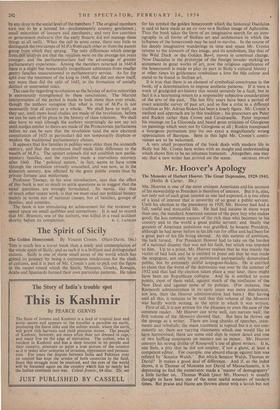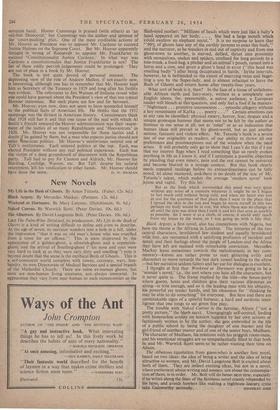Mr. Hoover's Apology
The Memoirs of Herbert Hoover. The Great Depression, 1929-1941. (Hollis & Carter. 30s.) MR. HOOVER is one of the most eminent Americans and his account of his stewardship as President is therefore of interest. But it is, alas, not only not of such great interest as one had expected, it is too often of a kind of interest that is unworthy of so great a public servant. Until his election to the presidency in 1929, Mr. Hoover had had a full, useful and successful life. He had had success in more ways than one; the standard American success of the poor boy who makes good; the less common success of the rich than who becomes to his country and to the world a great public servant; and finally the greatest of American ambitions was gratified, he became President, although he had never before in his life run for office and had been for a great part of his life living abroad. At this summit of ambition, the luck turned. For President Hoover had to take on the burden of a national disaster that was not his fault, but which was imputed to him. Up to a point, Mr. Hoover realises that he was mainly the victim of bad luck and he is entitled to point out that he was made the scapegoat, not only by an embittered and-partially demoralised public, but by extremely skilful scapegoat-finders. He is entitled to claim that the worst of the depression was over by the summer of 1932 and that had the election taken place a year later, there might have been no Republican collapse. And he is entitled to score points, most of them valid, against much of the confusion of the New Deal and against some of its policies. (For instance, the Roosevelt administration in its' early years was more isolationist, not less, than the Hoover administration had been.) But having said all this, it remains to be said that this volume of the Memoirs was hardly worth writing, in the spirit in which it was written.
First of all, it is not written for the pleasure or even the ease of the common reader. Mr Hoover can write well, can narrate well; the first volume of the Memoirs showed that. But here he throws up the sponge as a writer. There are long chunks of speeches, state- ments and rebuttals; the main treatment is topical but it is not con- sistently so; there are varying statements which one would like to have harmonised; there are some odd slips in minor detail and one or two baffling statements on matters not so minor. Mr. Hoover conveys his strong dislike of Roosevelt's use of ghost writers. It is, one feels, a pity that he did not employ, if not a ghost, at least a competent editor. For example, one absurd charge against him was refuted by 'Senator Walsh.' But which Senator Walsh, Thomas or David? It makes a good deal of difference. And if, as the index shows, it is Thomas of Montana not David of Massachusetts, it is depressing to find the exonerator made a 'master of demagoguery' a little further on. Thomas Walsh (pace Mr. Hoover) is usually thought to have been one of the most useful senators of modern times. But praise and blame are thrown about with a lavish but not accurate hand. Homer Cummings is praised (with others) as 'an old-line Democrat;' but Cummings was the author and sponsor of the 'court-packing' plan. One of the most creditable. actions of Mr. Hoover as President was to appoint Mr. Cardozo to succeed, Justice Holmes on the Supreme Court. But Mr. Hoover apparently thought it wrong of Roosevelt to appoint Mr. Frankfurter to succeed 'Constitutionalist Justice Cardozo.' In what way was Cardozo a constitutionalist that Justice Frankfurter is not? The list of these oddly peevish judgements could be prolonged. • They are out of place in a book by Mr. Hoover.
I-. The book is not quite devoid of personal interest. The pressing view of the role of Andrew Mellon, if not exactly new, interesting, although one has to remember that Mr. Hoover kept 'm as Secretary of the Treasury in 1929 and long after his futility as evident. The references to Jim Watson of Indiana reveal what ne could have guessed about the President's view of that too typical nosier statesman. But such plums are few and far between. ' Mr. Hoover, even now, does not seem to have reconciled himself `Ito the political facts of American life. He thinks that the 1932 campaign was the dirtiest in American history. Connoisseurs think that 1928 still has it and that one cause of the zeal with which Al Smith's friends smeared the Hoover administration was their resent- ment of the tactics of so many Republicans and 'Hoovercrats' in 1928. Mr. Hoover was not responsible for those tactics and I doubtif he gained by them, but a man who expects justice should not enter American politics. Mr Hoover's misfortunes remind one of Taft's misfortunes. Each entered politics at the top. Each, was i• elected President without any real political experience. Each was e victim of a deep groundswell of discontent with the Republican arty. Taft had to pay for Cannon and Aldrich; Mr. Hoover for arding, Coolidge, Watson, etc. But Taft, despite his natural resentment, left his vindication to other hands. Mr. Hoover should



































 Previous page
Previous page